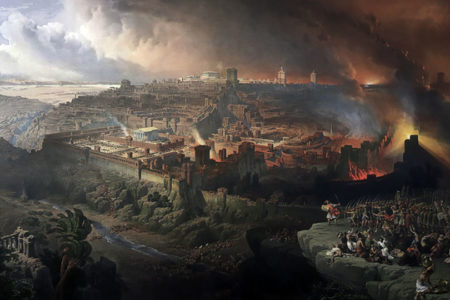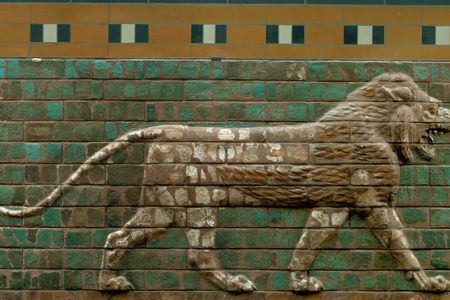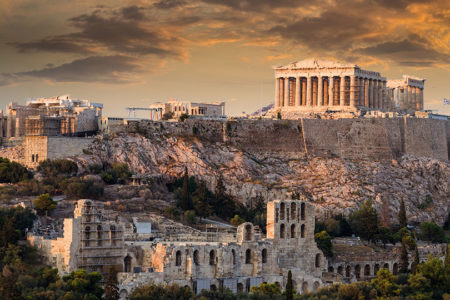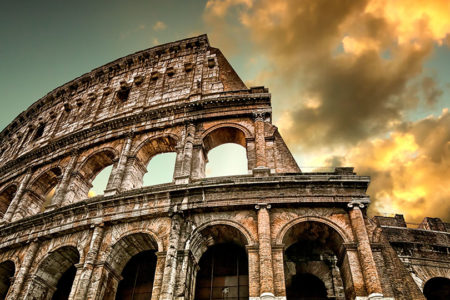The Greeks
When Bible readers move from the Old to the New Testament, they encounter many new ideas and institutions. They encounter groups like the Pharisees, Sadducees, Herodians, and Zealots, who are not mentioned in the Old Testament writings. New organizations like the synagogue and the Sanhedrin are prominent in the Gospels but do not appear in the Hebrew Scriptures. The last book of the Old Testament, Malachi, was written during a period when the Persians controlled Judea, but early in Matthew we read of Roman soldiers, centurions, and procurators. Obviously, something happened to change many of the conditions that existed among the Jewish people at the end of the Old Testament period.
Approximately four hundred years elapsed between the Testaments. Armies marched across Judea during this period, new ideas spread through the land, and new groups and institutions arose to meet the challenges of the day. One of the biggest changes was in language. The Old Testament was written in Hebrew, while the New Testament was written in Greek. The coming of the Greeks during the intertestamental period not only altered the language and lifestyle of most Jews but changed the history of the world.
This story begins with the childhood of a remarkable young prince, Alexander, son of Philip of Macedon. Tutored by the philosopher Aristotle, young Alexander showed exceptional physical prowess as a youth, foreshadowing the astounding military career that lay before him. For example, he tamed a wild horse that no one else could handle, named him Bucephalos, and rode him throughout most of his later conquests. His father had conquered and united the Greek peninsula, and, after his death, the youthful Alexander began his amazing career of military conquests. He vowed to avenge the attacks of the Persians that had occurred over a hundred years before, when Xerxes had dared to enter the Greek homeland. Imbued by Greek culture, he desired to spread those Hellenistic ideas along with his conquests. He fulfilled those goals in a career of a dozen years that altered the history of the Middle East and profoundly affected the life of the Jewish people. He is one of the few individuals in history always mentioned with the title the Great following his name, and he justly deserved that designation.
In 333 BC, Alexander began to exact his revenge when he and his army decisively defeated the Persians in a major battle at Issus in Syria, with Darius the king barely escaping with his life. Following this victory, Alexander entered the Middle East and began to take note of that particular people, the Jews. He requested their help in his battles along the Mediterranean coastline, but they refused, citing their loyalty to the Persians who had allowed them great freedom since the days of Cyrus, the king who permitted them to return from the Babylonian captivity (see Ezra 1:1–4). Josephus, the Jewish historian, vividly described Alexander’s exploits at this time, including his siege and conquest of the island fortress of Tyre, forever thereafter connected to the mainland by the causeway he built to enable his troops to reach it.
Bible readers should be particularly interested in this coastal conquest, because the Prophet Zechariah described it in poetic detail in chapter 9, verses 1–7 of his book. He predicted Alexander’s conquest of Syria (vv. 1–2a), Phoenicia (vv. 2b–4), and Philistia (vv. 5–7). At this point, Zechariah prophesied that Alexander would turn his attention to the Jews of Jerusalem: “And I will encamp about mine house because of the army, because of him that passeth by, and because of him that returneth; and no oppressor shall pass through them any more; for now have I seen with mine eyes” (Zech. 9:8). In other words, God would deliver them from Alexander’s anger. The way in which this was accomplished is described in a truly fascinating account preserved by Josephus:
When Jaddua, the high priest, heard that Alexander was coming, he was terrified and ordered his people to join him in prayer and sacrifice to God. When he learned that Alexander was not far from the city [Jerusalem], he went out in procession with the priests and the people. Alexander saw the procession coming toward him: the priests were clothed in linen and the high priest in a robe of blue and gold. On his head was a miter with the golden orate on which God’s name was inscribed. Approaching alone, Alexander prostrated himself before the Name and greeted the high priest.
As the Jews welcomed Alexander with one voice, his officers wondered if he had suddenly become insane. He replied, “When I was in Macedonia, considering how I could become master of Asia, I saw this very person in my sleep, dressed as he is now. He urged me not to delay, but to cross over confidently and take dominion over the Persians.” Alexander was escorted into Jerusalem by the high priest and his attendants. He went up into the temple, where he sacrificed to God according to the high priest’s directions. And when the Book of Daniel was shown to him, which predicted that one of the Greeks would destroy the Persian empire, he thought himself to be the one so designated. When he offered the Jews whatever they desired, the high priest asked that they might observe their own laws and be exempt from the tribute every seventh year. Alexander granted these requests (Antiquities, Book XI).
The passage from Daniel shown to Alexander was undoubtedly 8:3–7:
Then I lifted up mine eyes, and saw, and, behold, there stood before the river a ram which had two horns; and the two horns were high, but one was higher than the other, and the higher came up last. I saw the ram pushing westward, and northward, and southward, so that no beasts might stand before him, neither was there any that could deliver out of his hand, but he did according to his will, and became great. And as I was considering, behold, an he-goat came from the west over the face of the whole earth, and touched not the ground; and the goat had a notable horn between his eyes. And he came to the ram that had two horns, which I had seen standing before the river, and ran unto him in the fury of his power. And I saw him come close unto the ram, and he was moved with anger against him, and smote the ram, and broke his two horns; and there was no power in the ram to stand before him, but he cast him down to the ground, and: stamped upon him; and there was none that could deliver the ram out of his hand.
According to Daniel’s prophecy, Alexander the Great was the “he-goat … from the west” who would decisively conquer the “ram” that is, the Persian King Darius.
After he spared Jerusalem, Alexander continued his trek eastward and accomplished just what Daniel said he would. He completely routed the Persians at Guagemela in 331 BC. Soon he had occupied Babylon, Susa, Persepolis, and all the other Persian cities. He continued his conquests through what we know today as Iran, Pakistan, and Afghanistan, until India eventually lay at his feet. Only the exhaustion and the resistance of his own troops forced him to finally call an end to his campaigns. He returned to Babylon, where he lived in oriental splendor until his death in a drunken stupor at the young age of 33.
Following his death, Alexander’s great empire was divided among his four generals. Daniel 8:8 foretold this development as well: “Therefore, the he-goat grew very great; and when he was strong, the great horn was broken, and for it came up four notable ones toward the four winds of heaven.” These successors continued his policy of Hellenization, spreading the Greek culture, language, and religion as they founded many cities in the following years. The two divisions of the empire that affected the Jewish people the most were the Seleucids in Syria and the Ptolemies in Egypt. Actually, for a long while, little Judea was something of a bouncing ball between these two Greek kingdoms. For approximately one hundred years the Jews were ruled by the Egyptian Ptolemies, who were generally tolerant and allowed the high priest to freely administer the law to his Jewish subjects. From about 200 BC, onward, however, the Syrian Seleucids began a policy of forced Hellenization that resulted in many young Jewish men becoming enamored with Greek ways and beliefs. Those who remained faithful to the God of their forefathers became known as the Hasidim—the pious ones—who were the forerunners of the Pharisees in New Testament times. This forced Hellenization came to a head with the persecutions of the notorious Antiochus Epiphanes, who sought to force the Jewish people to worship Zeus and defiled the Temple in 168 B.C. This act, of course, led to the period of the Maccabean uprising, described by Josephus and the apocryphal books of the Maccabees. These brave men are those described by Daniel: “but the people that do know their God shall be strong, and do exploits” (Dan. 11:32). Their bravery led to the liberation of the Jewish people and the founding of the festival of Hanukkah.
While the pagan Greek influence was resisted by the faithful during this period, the spread of the Greek language throughout the region could not be halted. Most Jews had learned Greek by the time of the New Testament period. If they were involved in any sort of contact with the outside world, they had to know Greek, because it had become the language of international trade. One evidence of the spread of Greek can be seen in the very first translation of the Bible, completed during this period. It came to be known as the Septuagint (or the LXX), since it was originally translated by 70 Jewish scholars. The need for such a translation had become acute, especially for Jews living outside the land of Israel (i.e., in the Diaspora), who did not know the Hebrew language. It was finished around 250 BC. It was also used by some New Testament authors, who cited it in their quotations of the Old Testament.
While the spread of the Greek language and culture during this time had some negative effects, this development must also be viewed as part of the providential preparation by the Lord for the spread of the gospel message. By the first century, there was, in a real sense, a universal language spoken and/or understood virtually everywhere. The apostles used that language to take the gospel message to the corners of the empire. Also, the written documents comprising the New Testament (with the probable exception of Matthew) were written in Greek. Actually, these writings were composed in a common form of that language, the Koine Greek, not in the formal classical Greek, known only to scholars. Alexander would have been surprised to know that his spread of Hellenism had actually paved the way for a message that would eventually destroy his beloved Greek gods.
Although he was great in his contribution to history, his contributions were overshadowed by another who died at about the same age. His kingdom, unlike Alexander’s, did not fall apart after His death; it continued to attract followers, not by the power of the sword, but by the power of the Word. An anonymous author has eloquently compared these two individuals who each left his respective mark on history, albeit in vastly different ways:
JESUS AND ALEXANDER
Jesus and Alexander died at thirty-three;
One lived and died for self;
one died for you and me.
The Greek died on a throne;
the Jew died on a cross;
One’s life a triumph seemed;
the other but a loss.
One led vast armies forth;
the other walked alone;
One shed a whole world’s blood;
the other gave His own.
One won the world in life,
and lost it all in death.
The other lost His life to
win the whole world’s faith.
Jesus and Alexander died at thirty-three.
The Greek made all men slaves;
the Jew made all men free.
One built a throne on blood;
the other built on love.
The one was born of earth;
the other from above;
One won all this earth,
to lose all earth and heaven.
The other gave up all,
that all to Him be given.
The Greek forever died;
the Jew forever lives;
He loses all who gets,
and wins all things who gives.








